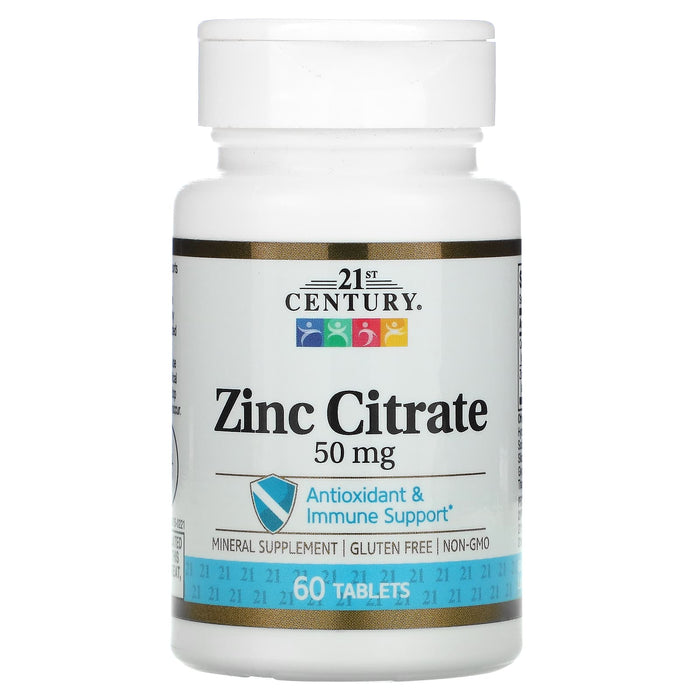




| Serving Size: 1 Tablet | ||
| Servings Per Container: 60 | ||
| Amount Per Serving | % Daily Value | |
| Calcium (as Dicalcium Phosphate) |
46 mg |
4% |
| Zinc (as Zinc Citrate) | 50 mg | 455% |
Support immune function and maintain skin health with 21st Century Zinc Citrate, a vital mineral supplement.
Zinc Citrate from 21st Century is an important antioxidant mineral that supports the immune system. This gluten-free, non-GMO, and vegan-friendly mineral supplement is guaranteed for quality, laboratory tested, and trusted for over 30 years.
As a mineral supplement, adults take one (1) tablet daily with any meal or as directed by a healthcare provider. Do not exceed recommended dosage. Individual results may vary.
Cellulose, stearic acid, hydroxypropyl methylcellulose, croscarmellose sodium. Contains <2% of: Magnesium silicate, magnesium stearate, polyethylene glycol, polyvinyl alcohol, silicon dioxide, titanium dioxide.
No added sugar, yeast, preservatives or artificial flavors.
Consult a healthcare provider prior to use if pregnant, nursing, on medications, have a medical condition or are planning a medical procedure. Stop use and contact a physician if adverse reactions occur.
Keep out of reach of children. Do not use if product appears to be tampered with or seal is broken. Store at room temperature.
At Health Orchard, we are committed to providing accurate product information and images. However, manufacturers may update their product packaging or ingredients, and these changes may not be immediately reflected on our website. It's possible for products to be shipped with different packaging than what is shown online. For the most accurate and safe use of any product, we advise reading the product's label, warnings, and instructions rather than relying solely on the details provided by Health Orchard.
Zinc citrate is a form of zinc supplement used to prevent or treat zinc deficiency. It supports immune function, wound healing, and protein synthesis. Zinc is also important for taste and smell perception, DNA synthesis, and cell division. Some people use zinc supplements to potentially shorten the duration of common colds.
Zinc citrate can be taken daily at recommended doses, which for adults are typically around 8-11 mg per day. However, long-term use of high-dose zinc supplements can lead to copper deficiency and other health issues. It's best to consult with a healthcare provider before starting a daily zinc supplement regimen, especially if you have any health conditions.
Zinc can be taken at any time of day, but it's often recommended to take it with food to reduce the risk of stomach upset. Some people prefer taking it in the morning with breakfast, while others take it at night.
Zinc citrate is a form of zinc, so the question is really about different forms of zinc supplements. Zinc citrate is generally well-absorbed and may cause less stomach irritation compared to some other forms. However, the "best" form can depend on individual factors and why you're taking zinc.
Yes, zinc citrate can support immune system function. Zinc plays a crucial role in the development and function of immune cells. It may help reduce the duration and severity of common colds when taken at the onset of symptoms. However, while zinc is important for immune health, more is not always better, and it's best to stick to recommended doses.
Common side effects of zinc supplements may include nausea, vomiting, loss of appetite, abdominal cramps, diarrhea, and headaches. Taking zinc with food can help reduce these effects. In high doses or with long-term use, zinc can interfere with copper absorption and potentially lead to anemia.